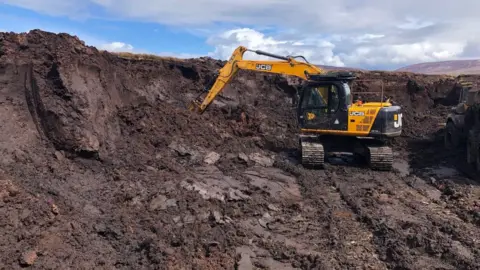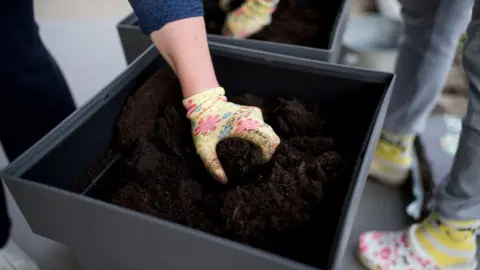How would a peat-based compost ban affect Scotland?
 BBC
BBCPeat extractors in Scotland could be hit by a proposed ban announced in England on the sale of peat-based compost.
Very little extraction is undertaken south of the border but there are still several sites in Scotland where it is removed commercially.
The practice is considered damaging to the environment because it is such an important store of carbon.
Peat has been used by commercial growers and amateur gardeners since the mid 20th Century, though today peat-free products are available.
Scottish peat extraction sites include one at Moy near Inverness, where the soil goes to a company in the Lothians for growing mushrooms.
It is unclear at this stage whether the proposed ban would affect this sector, but if it does the site's operator Brian MacGregor said it would cost jobs.
He said: "We have six staff employed here and it will have an impact on them. We are just satisfying demand from the UK mushroom industry.
"We are the only folk in the whole of the UK mainland extracting peat for the mushroom industry. Our product grows 500 tonnes of mushroom per week."
 Getty Images
Getty ImagesMr MacGregor has signed a £50,000 bond to restore the peatland site to the satisfaction of environment agencies.
He said there was no alternative to peat available to the mushroom industry.
"I can understand why the conservationists have targeted the hobby gardener, as they are a very easy target," he added.
In peak condition, such as in the massive Flow Country of Caithness and Sutherland, peatlands act as a store of harmful greenhouses gases. But once exposed, the sun's rays cause those gases to escape.
'Right move'
While the proposed ban affects England, the SNP pledged a similar move in its 2021 Holyrood election manifesto.
The International Union for Conservation of Nature (IUCN) said it understood the UK government would consult with the devolved governments of Scotland, Wales and Northern Ireland to achieve a wider ban.
Emma Goodyer, of the IUCN UK Peatland Programme, said an end to the sale of peat-based compost was the right move to help tackle climate change.
She said the ban would also cover "huge amounts" of peat exported from the Republic of Ireland and Baltic states.
"Peatlands are layers and layers of carbon from vegetation that built up in a waterlogged environment over thousands of years in most cases," she said.
"It is about protecting that peat in the ground where it is formed."
